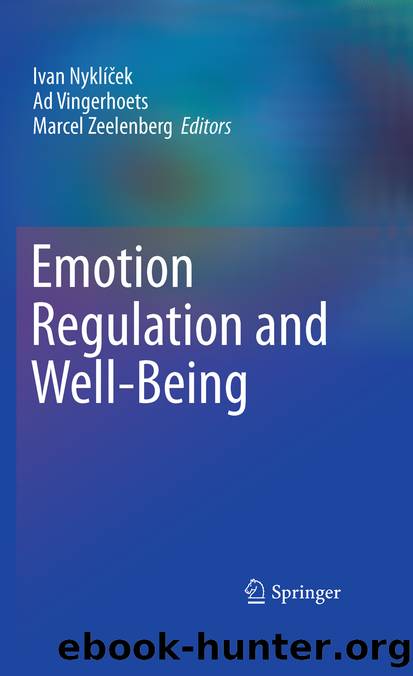Emotion Regulation and Well-Being by Ivan Nyklíček Ad Vingerhoets & Marcel Zeelenberg

Author:Ivan Nyklíček, Ad Vingerhoets & Marcel Zeelenberg
Language: eng
Format: epub
Publisher: Springer New York, New York, NY
10.1.2 Cognitive Decline
A powerful determinant of emotional reactions to a decision outcome is whether the outcome was compared with alternative outcomes or other states of the world (Boninger, Gleicher, & Stratham,1994; Gleicher et al.,1990; Kahneman & Miller,1986). This counterfactual thinking thus refers to the mental simulation of comparing the present state with other possible, but unobtained states (Roese,1997). Counterfactual thoughts are common in everyday experience and may exert a substantial influence (McMullen,1997). Research on outcome evaluation has shown that participants feel more strongly about an alternative if counterfactual alternatives are salient (Gleicher et al.,1990). A further distinction is made between counterfactuals that improve reality (thinking about how things could have been better), and counterfactuals that worsen reality (thinking about how things could have been worse) (Landman,1993; Sanna,1998). Regret is a negative emotion experienced when the present state of affairs is compared to a better counterfactual reality (what could have been better: Roese,1997; Van Dijk & Zeelenberg,2005). Regret, like other counterfactual emotions, thus relies on mentally simulating various alternative outcomes. Such cognitive activities also require deliberative capacity, and in this sense, regret can be seen as a higher-order cognitive emotion (Russell,2003). Several lines of research suggest age-related declines in the controlled processes of the deliberative system such as decreased speed of processing (e.g., Salthouse,1996), and deficits in explicit memory and learning (Cohen,1996). These changes are evident at a neural system level where the prefrontal cortex (related to working memory and executive functions such as the control and regulation of cognition) deteriorates with normal aging (MacPherson, Phillips, & Della Sala,2002). Since regret is a cognitive emotion relying on comparison (Zeelenberg & Pieters,2007) that involves orbitofrontal and prefrontal activation of the cortex (Camille et al.,2004; Coricelli et al.,2005), this line of research suggests that the experience of regret should decline with age and co-vary with age-related declines in deliberative capabilities. This is also consistent with research by Hess, who has hypothesized that aging is associated with increasing selectivity in task engagement because of actual or perceived declines in cognitive resources (Hess,2000,2006). Anticipation of regret has not, so far, been extensively studied across the adult life span, but given that anticipation is defined as “primarily cognitive expectations about future emotions, without actually experience them in the present” (Loewenstein, Weber, Hsee, & Welch,2001) it may be expected that cognitive decline should lead to decreased anticipation of regret. Similarly, emotion regulation is cognitively and physically demanding (Gross,2008) and so a purely cognitive perspective on emotion regulation suggests that emotion regulation should be less often employed and be less successful among older adults. However, recent research has shown that emotion regulation in fact increases with age and that older adults often are very skilled in regulating emotion (Charles & Carstensen,2007; Magai,2008; Gross,2008). Thus, decreased anticipated and experienced regret are expected for cognitive reasons.
Download
This site does not store any files on its server. We only index and link to content provided by other sites. Please contact the content providers to delete copyright contents if any and email us, we'll remove relevant links or contents immediately.
Rewire Your Anxious Brain by Catherine M. Pittman(18622)
Talking to Strangers by Malcolm Gladwell(13332)
The Art of Thinking Clearly by Rolf Dobelli(10383)
Mindhunter: Inside the FBI's Elite Serial Crime Unit by John E. Douglas & Mark Olshaker(9299)
Becoming Supernatural by Dr. Joe Dispenza(8186)
Change Your Questions, Change Your Life by Marilee Adams(7718)
Nudge - Improving Decisions about Health, Wealth, and Happiness by Thaler Sunstein(7678)
The Road Less Traveled by M. Scott Peck(7574)
The Lost Art of Listening by Michael P. Nichols(7480)
Mastermind: How to Think Like Sherlock Holmes by Maria Konnikova(7304)
Enlightenment Now: The Case for Reason, Science, Humanism, and Progress by Steven Pinker(7288)
Win Bigly by Scott Adams(7172)
The Way of Zen by Alan W. Watts(6578)
Daring Greatly by Brene Brown(6489)
Big Magic: Creative Living Beyond Fear by Elizabeth Gilbert(5726)
Grit by Angela Duckworth(5577)
Ego Is the Enemy by Ryan Holiday(5392)
Men In Love by Nancy Friday(5218)
The Laws of Human Nature by Robert Greene(5136)
